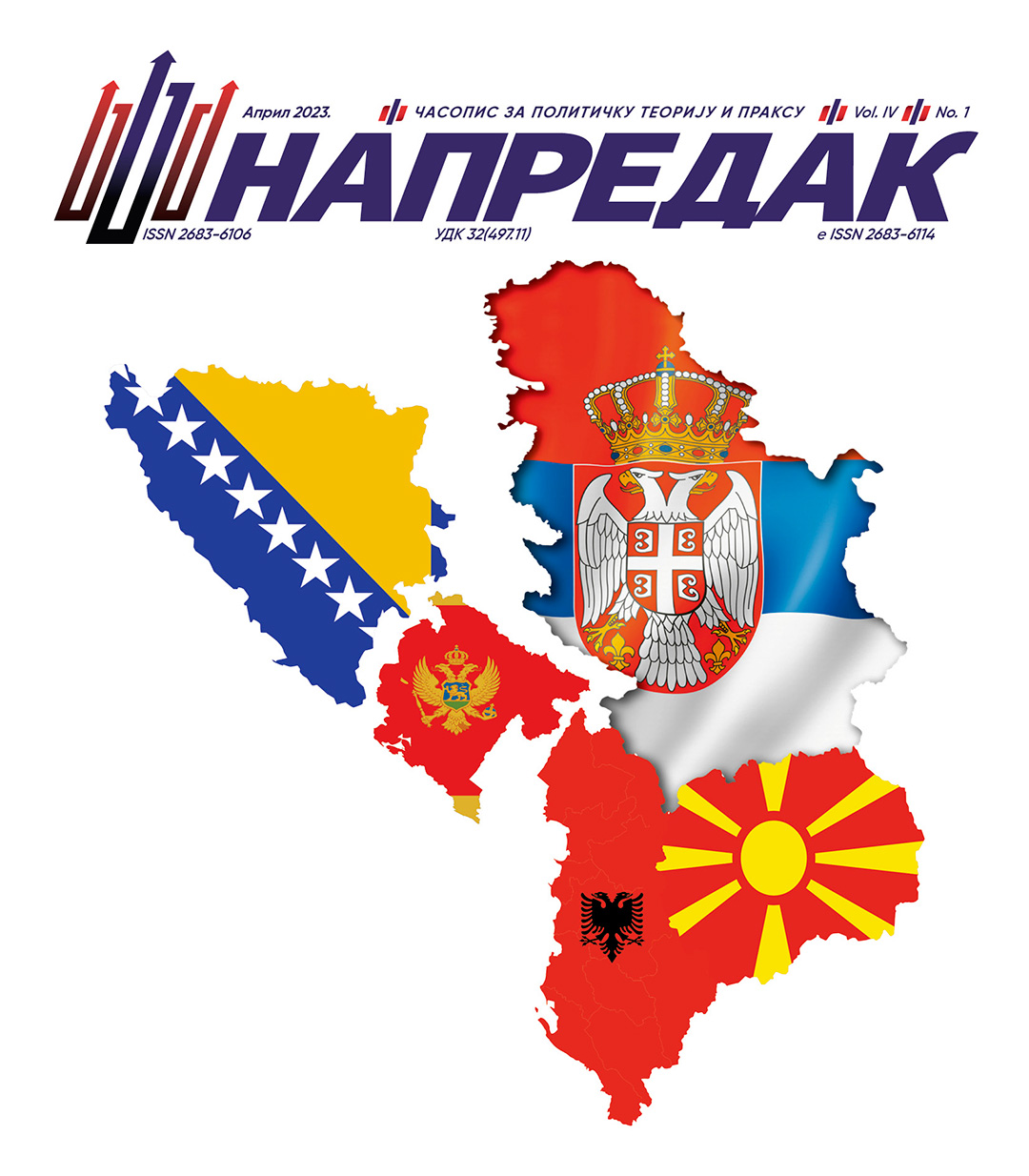Улога Oтвореног Балкана у актуелним регионалним односима из перспективе стратешке политике и европских интеграција
Sažetak
Регионалне иницијативе са економским предзнаком нису новина у међудржавним односима. Већина ових иницијатива имала је за циљ поспешивање и динамизацију економских кретања у једном региону, а тиме и динамизацију националних привреда држава учесница, имајући у виду чињеницу да економска сарадња између политичких ентитета у непосредном окружењу умногоме доприноси развоју националне привреде и тржишта управо због логистичких могућности, данас изузетно важних у регионалним и међународним економским кретањима. Циљ овог рада је анализа постојећих достигнућа у оквирима иницијативе Отворени Балкан, њених капацитета и могућности, али и домета на регионалном нивоу, као и у контексту европских интеграција региона. У складу с тим, главно истраживачко питање које нам се намеће у овом раду јесте: Да ли Отворени Балкан, као економска иницијатива, у стратешком смислу може поспешити бољу спољнополитичку позиционираност Србије и земаља учесница? У теоријском смислу, значај овог рада проналазимо у анализи улоге малих и микро земаља у регионалним односима и у процесу европских интеграција, које у одређеним околностима наступају заједнички кроз регионалне иницијативе, као и одговора на питање колико такве иницијативе доприносе ефикаснијем и ефективнијем реализовању спољнополитичких циљева малих и микро субјеката.
Reference
References / Литература
Arnaudov, M. (2021). Strategy of foreign policy of the Republic of Macedonia from 2006 to 2015. Beograd: Fakultet političkih nauka [In Serbian]
Buzan, B. (1983). People, States and fear: the national security problem in international relations. Brighton: Wheatsheaf.
Chamber of Commerce of Serbia. Novi Sad Declaration. Available at: https://api.pks.rs/storage/assets/Deklaracija_Novi_Sad1.pdf [In Serbian]
Chamber of Commerce of Serbia. Ohrid Declaration. Available at: https://api.pks.rs/storage/assets/Deklaracija_Ohrid1.pdf [In Serbian]
Chamber of Commerce of Serbia. Open Balkans. (10 February 2023). Available at: https://pks.rs/open-balkan. [In Serbian]
Chamber of Commerce of Serbia. Tirana Declaration. Available at: https://api.pks.rs/storage/assets/Deklaracija_Tirana.pdf. [In Serbian]
Ćurčić, M. (2022). All roads of Montenegro and Bosnia and Herzegovina lead to “Open Balkans”. Available at: https://www.politika.rs/scc/clanak/496624/Svi-putevi-Crne-Gore-i-BiH-vode-u-Otvoreni-Balkan [In Serbian]
Ejdus, F. (2012). International security; theories, sectors and levels. Beograd: JP Službeni glasnik; Beogradski centar za bezbednosnu politiku. [In Serbian]
Euronews/Tanjug. North Macedonia and Albania accept Serbia’s initiative for forming a work group for the cooperation in the energy crisis. Available at: https://www.euronews.rs/srbija/politika/56895/severnamakedonija-i-albanija-prihvatile-inicijativu-srbije-za-formiranje-radne-grupe-za-saradnju-u-energetskoj-krizi/vest. [In Serbian]
Hey, K. (ed.), Jeanne, A. (2003). Small States in World Politics. London: Lynne Rienner Publishers. Available at: https://books.google.rs/books?hl=sr&lr=&id=WP1_-k2RGoMC&oi=fnd&pg=PP11&dq=foreign+policy+strategy+small+states&ots=QEeI4gmODu&sig=6-SNbVEUFziKT41SajAp5J89MWo&redir_esc=y#v=onepage&q&f=false
Luša, Đ., Mijić, P. (2012). Foreign policy of small states – normative power as a factor of influence in international relations, Političke perspektive: časopis za istraživanje politike, 2 (3), 39-65. Available at: https://www.fpzg.unizg.hr/znanost_i_istrazivanja/casopisi/politicke_perspektive [In Croatian]
Janković, S. (2022). What are the differences and similarities between Open Balkans and Berlin Process? Available at: https://www.slobodnaevropa.org/a/berlinski-proces-otvoreni-balkan-crna-gora/32187555.html. [In Serbian]
Kosovo Online/Syri. (2022). Kurti: “Open Balkans” will not work. Serbia wants to destabilize the Balkans. Available at: https://www.kosovoonline.com/vesti/politika/kurti-otvoreni-balkan-nece-uspeti-srbija-zeli-da-destabilizujebalkan-28-6-2022 [In Serbian]
Miletić, A. (1978). National interest in the American theory of international relations. Beograd: Savremena administracija. [In Serbian]
National Security Strategy of the Republic of Serbia. (2019). Available at: https://www.pravnoinformacionisistem.rs/SlGlasnikPortal/eli/rep/sgrs/skupstina/strategija/2019/94/2. [In Serbian]
Official Page of the Berlin Process. (2023). Available at: https://www.berlinprocess.de/en/the-berlinprocess-2014 [In Serbian]
PKS. Signed agreements. Available at: https://pks.rs/open-balkan-sporazumi/potpisani-sporazumi. [In Serbian]
RTRS. (2022). Dodik: “Open Balkans” is a good, useful and innovative project that is already producing results. Available at: https://lat.rtrs.tv/vijesti/vijest.php?id=485124 [In Serbian]
RTV. (2022). Đukanović: Taking Montenegro into Open Balkans is equal to high treason. Available at: https://www.rtv.rs/sr_lat/region/djukanovic-uvodjenje-crne-gore-u-otvoreni-balkan-ravno-veleizdaji_1395967.html [In Serbian]
Simić, D. R. (2009). World politics – interstate and international order. Beograd: Čigoja štampa. [In Serbian]
Vukićević, J. (2022). “Open Balkans” disputed from the civil sector. Available at: https://www.slobodnaevropa.org/a/crna-gora-zapadni-balkan-civilni-sektor-otvoreni-balkan/32100266.html [In Serbian]

